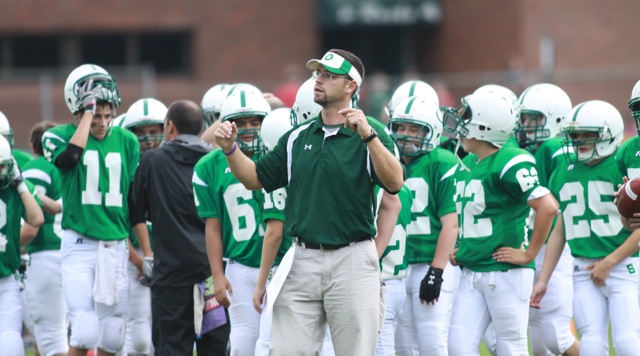Insidious leadership and cowardly followership
The now infamous “hits seen around the world” have been watched more than 11 million times on YouTube. The video shows referee Robert Watts attacked by two players during a football game between John Jay and Marble Falls high schools in San Antonio last year. Michael Moreno and Victor Rojas, who delivered the blindside hits, still claim Watts used racial slurs toward their teammates, which Watts fervently denies.
John Jay assistant coach Mack Breed admitted to telling the players to make Watts “pay the price” for his insulting remarks to the players. In the fall-out, Breed resigned from his position, the two players were suspended from the school, and Watts has retained legal representation and is considering pressing chargers against the players.
 From a leadership perspective, everything about this story stinks of foul ethics and decision-making. According to an ABC News report, Breed pulled Moreno and another player aside and told them to hit the referee. Crossing this type of morality line is inexcusable for anyone in a leadership position, and to add more fuel to the fire, the consequence is paid leave for Breed — a slap on the wrist. Moreno said in the same report, “You put your trust into this grownup, this guardian, your coach, who’s been there for me. … I trust him. I did what I was told.”
From a leadership perspective, everything about this story stinks of foul ethics and decision-making. According to an ABC News report, Breed pulled Moreno and another player aside and told them to hit the referee. Crossing this type of morality line is inexcusable for anyone in a leadership position, and to add more fuel to the fire, the consequence is paid leave for Breed — a slap on the wrist. Moreno said in the same report, “You put your trust into this grownup, this guardian, your coach, who’s been there for me. … I trust him. I did what I was told.”
Hopefully, this former coach is sidelined indefinitely. I don’t want to simply call out the dangerous actions of the assistant coach, but more importantly that of the players — the followers — who blindly obeyed and those who heard the same warped command yet failed to comply. Why were Moreno and Rojas the only ones to carry out their coach’s violent wishes to cowardly assault an official while other players ignored it?
Cowardly followership
I have yet to see interviews with the teammates who heard Breed’s decree but chose to ignore it. Some questions I would like answered include:
- What did they think of their coach’s command?
- Why did they not follow his order?
- What did they think of Moreno’s and Rojas’ actions?
- How many were on the fence about following this order?
- How many heard those reputed racist remarks from this game official?
- Do they believe the punishment fit the crime?
If conducted, these interviews would reveal plenty about the mindset and thought processes of the players who saw fit not to cross the ethical line from tackling opponents to twice tackling an official from behind. The responses from these questions could be used to help educate other athletes about the deleterious impact that blind, cowardly followership can have.
As an aside, followership is a term often dismissed in sports, especially since society views followers as “second-class citizens” who are passive, inferior and conforming, lacking a leader to show them the way. Children are taught to be leaders and not followers, as leaders are characterized in the media as charismatic heroes here to save the day. Yet these same outlets highlight the voluminous numbers of misguided, unethical and toxic leaders in all fabrics of our society, from religion, government, education, military, business and even sports.
If there was greater emphasis placed on courageous followership throughout our society, these particular players could show these bad and ineffective leaders the way. After all, where would any leader be without followers?
Courageous followership
In the book, “Courageous Follower: Standing Up To & For Our Leaders,” Ira Chaleff posits a theory specific to being a more courageous follower. That includes having the courage to assume greater responsibility; serve and work hard for all involved; challenge the leader by sharing viewpoints, especially those counter to the leader’s; be a change agent who is committed to improving the team or organization; and take moral action as necessary.
Robert Kelley, author of the book, “The Power of Followership,” believes there are five particular styles of followership. The particular style that best characterizes the actions of Moreno and Rojas, the “sheep,” refers to those who blindly do what they are told. Other styles include “yes-people” (those who side with the leader); “the alienated” (stand on their own two feet yet are cynical); “pragmatics” (work hard to maintain the status quo, especially when it serves them to do so); and the “star followers” (committed workers who challenge authority to add value to the team). Kelly believes peer pressure, or pressure from authority, is more of a followership issue than a leadership one. In his words, “Kids should be taught better followership skills so they learn how to protect themselves from those who encourage them to engage in either self-destructive or socially destructive behavior, as well as learn how to support positive leaders.”
These followership skills must be taught so incidents like the one in San Antonio become a thing of the past.
- Think for yourself and have confidence in sharing these opinions and views with others.
- Take responsibility for your own actions. Blaming others is not being accountable or responsible.
- Actions speak louder than words, so ensure your actions reflect good morals.
- Be truthful when sharing your thoughts and viewpoints — being less than truthful erodes credibility.
- Challenge teammates to adhere to team rules, norms and standards while calling to question your leader’s confusing or unethical decisions or action (by talking to an adult).
- Ask to be involved in planning the vision for the team for the season, including goals, mission statements and what needs to be accomplished on a daily basis for the goals to be achieved.
- Identify what needs to be changed for team improvement while offering suggestions on how to create change in an expedient fashion.
- Work to maintain effective relationships with leaders and teammates via good communication practices, like being a good listener, following through on promises and checking-in with others.
- Perform the best you can, without excuses or complaining.
- Support the decisions of positive leaders and offer them feedback about what is working and what is not.
- Share with your coach what you want to accomplish this season and how you want to contribute to the team’s success.
- Seek out a mentor to help you be the best follower and future leader you can, such as a parent, teacher, former coach or sport psych consultant.
Mike Voight is the author of “The Sports Leadership Playbook.” Find him on Twitter at @drvoight or visit www.drmikevoight.com.





